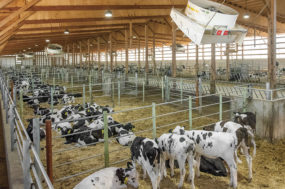While the U.S. has reduced support mechanisms for dairy farmers in recent years, a wide range of foreign dairy subsidies remain, limiting the U.S. industry’s ability to sell more of its products overseas, the National Milk Producers Federation (NMPF) said yesterday.
In testimony before the House Agriculture Committee (PDF, 190KB), NMPF said these foreign dairy support programs impede an industry that has gone from exporting less than $1 billion in dairy products in 2000 to $7.1 billion last year.
“Trade agreements have helped make this possible by lowering and removing barriers to our exports,” said Jaime Castaneda, NMPF’s senior vice president. “However, they have done little to constrain the use of domestic supports in the dairy sector or agriculture as a whole.”
Foreign dairy subsidies take different forms, ranging from direct aid, to import protections and regulatory measures designed to give foreign dairy producers an advantage over U.S. competitors.
According to Castaneda, the 28-nation European Union is the biggest provider of direct dairy support, offering cash payments, storage subsidies, price supports and, most recently, emergency aid to producers to counter low prices. In addition, the EU is attempting to limit dairy imports further by blocking the use of commonly used product names outside prescribed areas.
For example, Castaneda said, an American producer of feta or parmesan cheese can no longer sell those products within the EU, even though the names have been widely used for many years. “What better way to impede or prevent imports of a given product than to ban the use of its name?” he said.
Other major countries providing direct support to their dairy farmers include Canada, India, New Zealand and Japan, among many others, Castaneda said.
“While the United States has reduced its dairy subsidies and support mechanisms, other countries have maintained and expanded theirs,” Castaneda said.
In addition to his NMPF role, Castaneda works closely with the U.S. Dairy Export Council in promoting the U.S. dairy industry’s interests globally. PD
—From National Milk Producers Federation news release



